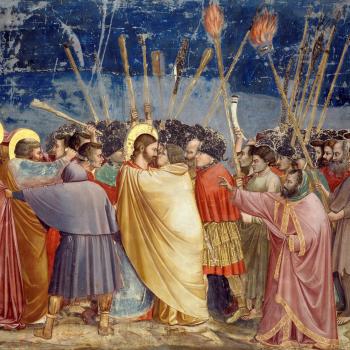…via G.K. Chesterton. What’s not to love?
I first learned of G.K. Chesterton in 2007, while contemplating whether I should be baptized as a Christian.
My year between leaving Islam and being baptized as a Christian had rendered me spiritually rudderless. I had subscribed to the view that all religions were equally useless. At the time I was working in a marketing company, under a boss who helped me to realize that evil really does, in fact, exist. There are some among us who lie, to ourselves and to others, so routinely that all bearing of truth gets lost, and the most fitting description for such a state is evil. My life had become something of a mess in the other few aspects as well. I was depressed and eager for some sort of a fresh start. For the first time in my life, I was willing to lend an ear to the Gospel message, to consider what life would be like as a born again.
A desire to learn the basics of Christianity led me to begin reading the works of C.S. Lewis, whom I learned was profoundly impacted by a book titled The Everlasting Man, an explanation of human history with Jesus Christ as the great turning point, by a man named G.K. Chesterton. It was said that Lewis even referred to the reading of this particular book as the “baptism of his intellect.” So I decided to go ahead and pick it up. For several years, I had been at peace with the popular notion that believing Christians were dense. This was one of many presuppositions that I had picked up over the years. Chesterton’s work began challenging this notion in only the first few sentences: he was clearly more intelligent than me, and he was a believing Christian.
It was this book, more than any other, that helped me realize that the Incarnation and the Resurrection of our Lord were plausible.
I was baptized in 2007, joined a Presbyterian church in 2008, and swiftly involved myself in Evangelical Christian circles. On occasion, a fellow Christian would explain to me that Catholics believed in certain doctrines that were “out there,” such as transubstantiation, the Sacrament of Confession, Purgatory, beliefs, and practices surrounding the Virgin Mary, and the Magisterium. Most of my fellow Christians considered Catholics to be fellow Christians. Some did not. Being relatively new to the faith, and still largely unfamiliar with the arguments for or against any such beliefs, I would simply nod along.
I was also an avid reader, one who was very eager to learn more about this Christian faith that I had impulsively embraced. And there was one particular author who I just could not get enough of. I went on to read more of Chesterton’s apologetic: Orthodoxy, Heretics, What’s Wrong With the World, St Francis of Assisi, and St Thomas Aquinas. A few of these works I even re-read. I also read some of Chesterton’s fiction: the Father Brown mysteries, the Man Who Was Thursday, the Ball and the Cross, and Manalive.
This man had something, and something of profound humor and clarity, to say about seemingly any subject; theology, politics, literature, economics, art and architecture, and even cheese. Even more impressive than the sheer diversity of subjects that he wrote about was the sheer consistency with which he wrote about them. He was an author who had very clearly spent time meditating on the “first things,” that he could see the big picture and let his thoughts about any and every subject fall into place from there. He went to pains to contextualize events, such as the Punic Wars and the Crusades, that I began to view history less in terms of the content of events, and more in terms of the movement of ideas. He was a sincere seeker of Truth.
We are each and all battered by various ideas from infancy onward about what is true. Whether it be from our families, our circle of friends, our communities, religious or nonreligious circles, schools, the people we admire, the music we listen to, what we choose to read, what we watch on television…etc., everyone and everything seems to want to have a say in the matter of “what is true”. We do not have ideas; ideas have us. Going even deeper, there may well exist spiritual realities that give form to the ideas that become our gods. Navigating through all of our presuppositions, and finding whatever truth is, is very challenging. But it is a challenge that we are each individually called to engage in. Tragically, all too many of us are not up to this task. And those among us who are must face the daunting question: Where does one even begin?
The works of G.K. Chesterton suggest that there is indeed an answer, one echoed by many of history’s wise men and women, of where to begin: we begin with common sense.
Common sense still remains uncommon enough to truly test our cognitions. I cannot count the number of times he has challenged my own previous assumptions. He had the very Catholic habit of seeing a touch of the divine in simple things. He was often a sharp critic of what was deemed “higher culture.” This “Apostle of Common Sense” raved about medieval thinkers, and routinely deconstructed so many of the contentions of his contemporaries. By giving consideration to context, rather than merely content, he pointed out how often it is and has been, the case that ideas we call “new” are really just recycled heresies.
Chesterton, this “Prince of Paradox,” led me to suspect a very odd notion that truth and humor go hand-in-hand, that a child’s perspective is clear because it is fresh, that there may well be an intimate bond between sainthood and sanity.
There was also one glaring fact about G.K. Chesterton that I had come across several times: he was a convert to the Catholic Church, having formally joined in 1922, at the age of 48. The Church is where his deep thinking led him to.
By 2011, I realized that my own Christian journey was yearning for some sort of change. New York is a very transient city, and most of the friends I had made in my church had moved on, whether to another city or to another church. My Presbyterian church was very outstanding at teaching a truth, that I still consider it the right church for me in my spiritual infancy. But I began to wonder if others truths were being neglected in its teaching if there was perhaps some balance of truths. I had listened to the same message during sermons, about being a terrible sinner desperately in need of the gift of God’s grace which I did not deserve, so many times that it began to seem like a monomania. I could no longer sit near the front pews, or the pastor would catch me sleeping. The categorizing of all people as either “believers” going to Heaven or “unbelievers” going to Hell seemed oversimplified. Even if this particular church molded its members into solid theological Christians, my confidence in its ability to mold psychological Christians was wavering. It was clear that a change was wanting in my journey, but: Where does one even begin?
There’s a lot more. Check thou it out.
C.S. Lewis remarked that, as an atheist, he found Chesterton the most sensible man in England, apart from his Christianity. After reading The Everlasting Man, he said he found his Christianity the most sensible philosophy–apart from its Christianity.
It is indeed a very strange moment when you realize the thing makes deep and satisfying sense–and yet your whole social training tells you it’s ridiculous to believe such rubbish. You discover that faith is both a gift and that there is still and all a real element of *choosing* to believe in Christ and his gospel. It’s been forty years since I came to faith and 30 years since I became a Catholic and I still feel acutely the wonder of it.












